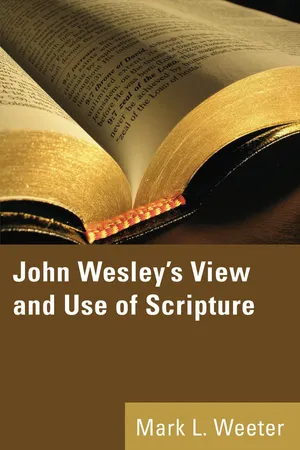
- 260 pages
- English
- ePUB (mobile friendly)
- Available on iOS & Android
John Wesley's View and Use of Scripture
About this book
John Wesley by his own words considered himself a "Man of One Book," meaning of course the Scriptures. Yet what does this seemingly declarative statement really mean? What was Wesley's view on the inspiration, authority, and even the infallibility of Scripture? This question is more than a historical curiosity when we recognize the current debate between evangelical groups over their views of the authority of Scripture. Recognizing the debt all Wesleyan movements have to Wesley's teachings and doctrines, this book will attempt to answer some critical questions about Wesley's view and use of the Bible. How did Wesley develop his views? How did he incorporate Scripture into his development of the Methodist movement? What was the position of Scripture in what has become known as the Wesleyan Quadrilateral of reason, experience, tradition, and Scripture? What were his views on inspiration and infallibility and would his principles of interpretation hold up against modern, critical scholarship?Finally, and perhaps most importantly, what influence did Wesley's view and use of the Bible have upon the success of the Wesleyan Revival? Are there lessons we can still learn from Wesley that could impact the world and church of the twenty-first century? This book will attempt to answer these and many other fascinating questions about John Wesley, a "Man of One Book."
Frequently asked questions
- Essential is ideal for learners and professionals who enjoy exploring a wide range of subjects. Access the Essential Library with 800,000+ trusted titles and best-sellers across business, personal growth, and the humanities. Includes unlimited reading time and Standard Read Aloud voice.
- Complete: Perfect for advanced learners and researchers needing full, unrestricted access. Unlock 1.4M+ books across hundreds of subjects, including academic and specialized titles. The Complete Plan also includes advanced features like Premium Read Aloud and Research Assistant.
Please note we cannot support devices running on iOS 13 and Android 7 or earlier. Learn more about using the app.
Information
Section I
John Wesley’s View of Scriptural Instruction
The Formation of Wesley’s Views on Scripture
Part 1
Table of contents
- Title Page
- Abbreviations
- Introduction
- Section I: John Wesley’s View of Scriptural Instruction
- Section II: John Wesley’s View of Inspiration and Infallibility
- Section III: John Wesley’s View of Scriptural Interpretation
- Bibliography